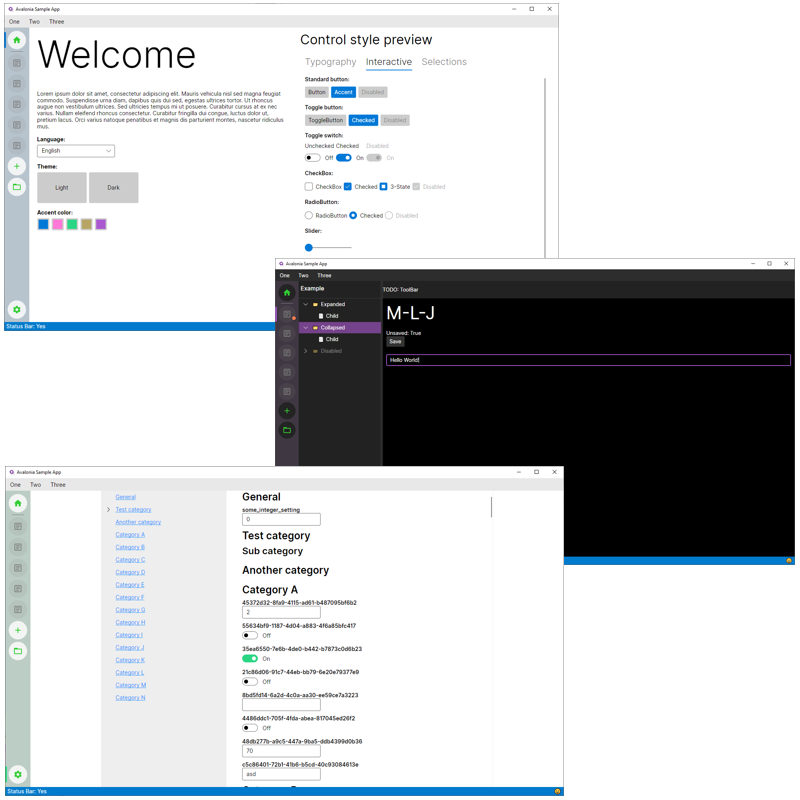Avalonia is a great UI framework for cross-platform apps. Much like WPF, all the fundamental building blocks are there but developing a real application using proper architecture takes a bit more work.
You can use this example app as a base for getting started quickly and building your own projects on top of it. It demonstrates a modular design (features), light and dark themes with customizable accent color, localization, and common application services such as messaging and dependency injection. The overall architecture is intended to be very extensible.
Please check out the more detailed documentation on how to use these features.
💡 TIP:
If you are new to Avalonia, make sure you have the Visual Studio extension installed: https://marketplace.visualstudio.com/items?itemName=AvaloniaTeam.AvaloniaVS
This solution uses the MVVM Community Toolkit for code generated properties and commands, but you may of course choose Reactive UI - or go completely without!
- Modularity. The application consists of Features i.e. autonomous packages that contain views (and their view models) as well as service-like logic that other features may utilize. Features have overridable life-time methods for controlled wire-up and tear-down.
- Themes. Avalonia ships with Dark and Light "Fluent" themes that can be switched at runtime. Also the accent color used in control styles can be changed.
- Localization. Features may introduce their own Resource Dictionaries that contain localizable strings. Changing the language can be done at runtime. Localized strings can be accessed both from AXAML and C# code. This app is partially translated into Finnish.
- Published Views. Features may introduce named views that can be instantiated anywhere in AXAML (and by other features, too). Published views support parameters.
- SVG Icons. Vector icons are always crisp regardless of resolution or UI scaling. The app demonstrates how to dynamically colorize them, too.
- Dependencies. Features may implement services via interfaces, and then other features or view models may have those instances automatically populated for them.
- Common settings system. Features and view models may utilize settings stored as key-value pairs. These settings are also saved on disk.
- Common paths. Features and view models may request commonly used paths for application data, temporary data, or user data.
- Messaging. Features and view models may communicate with each other via messages. The Messenger uses the Weak Event Pattern for subscriptions.
- The Shell acts as the root feature and defines the main layout for other views.
- The Navigation pane (ViewSelector) on the left contains static Home, New, Open, and Settings items.
- The Navigation pane contains a project list that also serves as the "Recent Files" list. New projects can be added, and existing projects can be removed (via the context menu).
- Home screen (the default view) showcases how theming options and the language setting updates the UI.
- Menu and StatusBar only have some dummy content and are there just for the looks (well, they also demonstrate localization).
- AppSettings contains UI for settings. Features may publish their settings to this centralized view.
- Project view contains some dummy data and shows how to mark projects as "Dirty".
The solution uses:
- .NET 7
- Avalonia 11.0.0 preview 8
No special setup is needed. Open in Visual Studio and just Build & Run (assuming you have the .NET 7.0 SDK installed).
This software is released under the MIT license.
SVG Rendering enabled by wieslawsoltes/Svg.Skia.
MessageBox enabled by AvaloniaCommunity/MessageBox.Avalonia.
The SVG icons are from Google's material symbols library.
